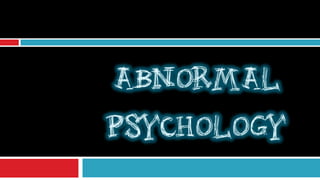
Abnormal Psychology
- 2. TYPES OF DISORDERS Anxiety Disorders Delusional Disorder Mood Disorders Substance Use Disorders Personality Disorders Somatoform Disorders Schizophrenia Dissociative Disorders
- 3. What Is Abnormal? Deviating from the normal or average The study of behavior patterns that diverge widely from generally accepted norms
- 4. WAYS TO DEFINE ABNORMAL PSYCHOLOGY Two ways to define abnormal psychology 1. Statistical Deviation 2. Maladaptiveness
- 5. Statistical Deviation Those who Most human stray too characteristi far from cs are nicely the average distributed on this along a curve are smooth bell- then shaped curve considered abnormal.
- 6. Maladaptiveness 1. Maladaptive to one's self - inability to reach goals, to adapt to the demands of life 2. Maladaptive to society - interferes, disrupts social group functioning.
- 9. Anxiety Disorders People with anxiety disorders feel an abnormal amount from common things In all types of anxiety disorders, anxiety is the main symptom
- 10. Types Of Anxiety Disorders Four major types of anxiety disorders 1. Generalized anxiety or panic disorders 2. Phobias 3. Obsessive-compulsive disorders 4. Post traumatic stress disorder
- 11. Phobias A fear of a specific stimulus or situation The sufferer of a phobia usually knows that the fear is irrational but cannot do anything about it
- 12. Types Of Phobias Phobia has three sub-classes: 1. Simple Phobia 2. Social Phobia 3. Agoraphobia
- 13. Obsessive-Compulsive Disorders An obsession is the persistent intrusion of unwelcome thoughts, images, or impulses, that cause anxiety A compulsion is an irresistible urge to carry out certain acts or rituals that reduce anxiety Individuals with obsessive-compulsive disorder Know that their behavior is irrational but are unable to resist Resistance only causes them to become anxious and only the carrying out of the act will relieve that anxiety
- 14. Post-Traumatic Stress Disorder Caused by a traumatic event that overwhelms a person Ruins their ability to cope with a situation Can cause flashbacks, nightmares, insomnia, and guilt. Extremely long lasting
- 15. MOOD DISORDERS
- 16. MOOD DISORDERS Disturbances of normal mood Also known as affective disorders
- 17. Types Of Mood Disorders Two general classifications for mood disorders 1. Bipolar Disorders (manic-depression) Swings from depression (extreme sadness) to mania (extreme happiness) 2. Depressive Disorders Extended, unexplainable periods of sadness
- 19. Personality Disorders A person with a personality disorder Uses improper and immature ways to deal with problems or situations Does not feel like they are doing anything wrong Thus do not want to change their behavior
- 20. Schizophrenia
- 21. Schizophrenia is a mental disorder characterized by a disintegration of thought processes and of emotional responsiveness. The psychiatrist Kurt Schneider listed the forms of psychotic symptoms that he thought distinguished schizophrenia from other psychotic disorders.
- 22. Schizophrenia patient may experience hallucinations Delusions (often bizarre or persecutory in nature) This is divided into two sub-categories 1. Persecutory delusions 2. Delusions of reference 3. Positive and negative symptoms
- 23. Causes Genetic and environmental factors play a role schizophrenia. Genetic There are more chances if disease was present in ancestors. Environment drug use , Living in an urban environment
- 24. social isolation and immigration related to social adversity, racial discrimination, family dysfunction, unemployment, and poor housing conditions
- 26. Uncommon psychiatric condition in which patients present with circumscribed symptoms of non-bizarre delusions Believes that he is the greatest, strongest, fastest, most intelligent person ever
- 27. Symptoms Patient expresses an idea or belief with unusual persistence The individual tends to be humorless and oversensitive, especially about the belief
- 29. Substance Use Disorder Include substance abuse and substance dependence It refers to the overindulgence in and dependence of a drug or other chemical The disorder is characterized by a pattern of continued pathological use of a medication, non- medically indicated drug or toxin
- 30. Causes Adverse social consequences related to drug use, such as Failure to meet work Family School obligations Interpersonal conflicts, or legal problems
- 31. Dissociative Disorders Also called group of disorder Characterized by a disruption in the normal functioning of consciousness, identity, memory, or the world around me Can be acute or chronic
- 32. Causes Drugs broad line personality disorder Alcohol abuse sexual abuse Types Dissociative fugue Dissociative amnesia Depersonalization disorders
- 33. Impulse Control Disorder High firm emotion Types: Pathological gambling Sexual complexity Kleptomania Trichotillomania Intermittent explosion disorder
- 34. Causes Disturbance in neuro-trasmission Bad childhood experiences Frustration
- 35. How Do Psychologists View Suicide? In the psychological sciences, most suicidologists admit degrees of suicide are based on individuals' beliefs, strength of intentions, and attitudes
- 36. How People Have Explained Abnormal Behavior? The legal definition of abnormality declares a person insane when a person is not able to judge between right and wrong
